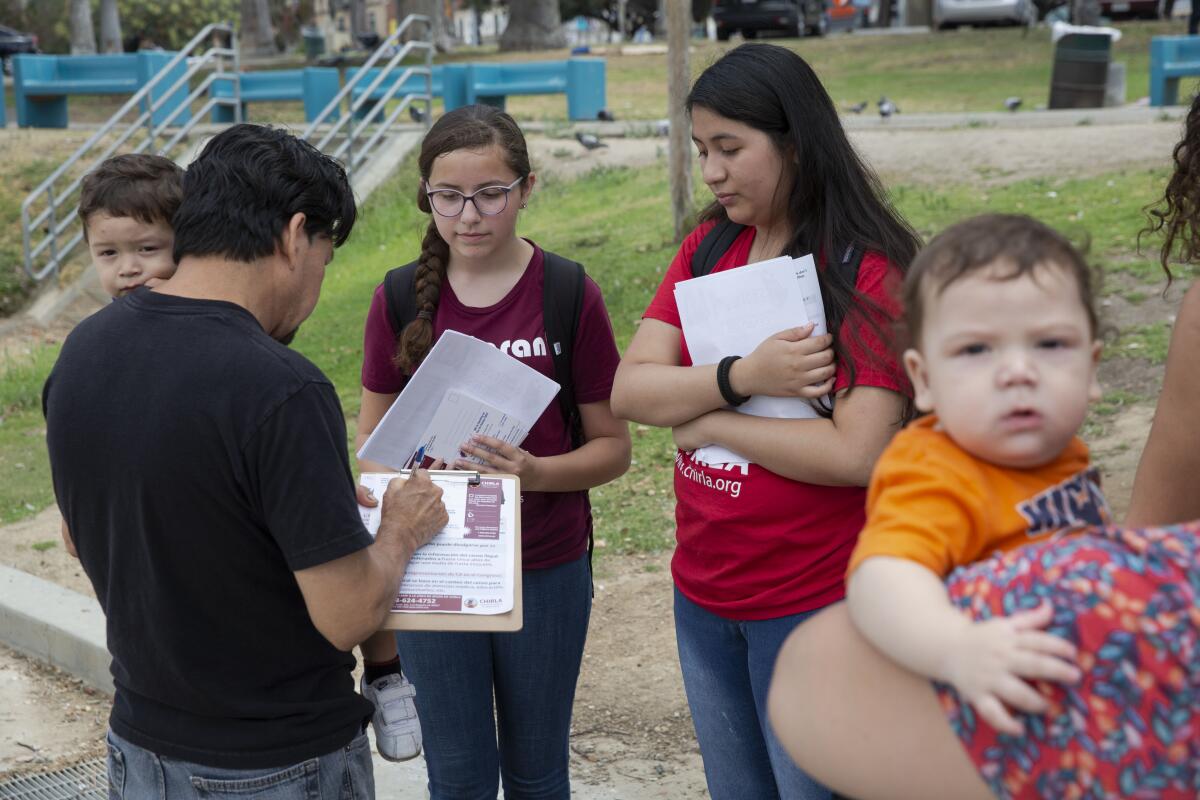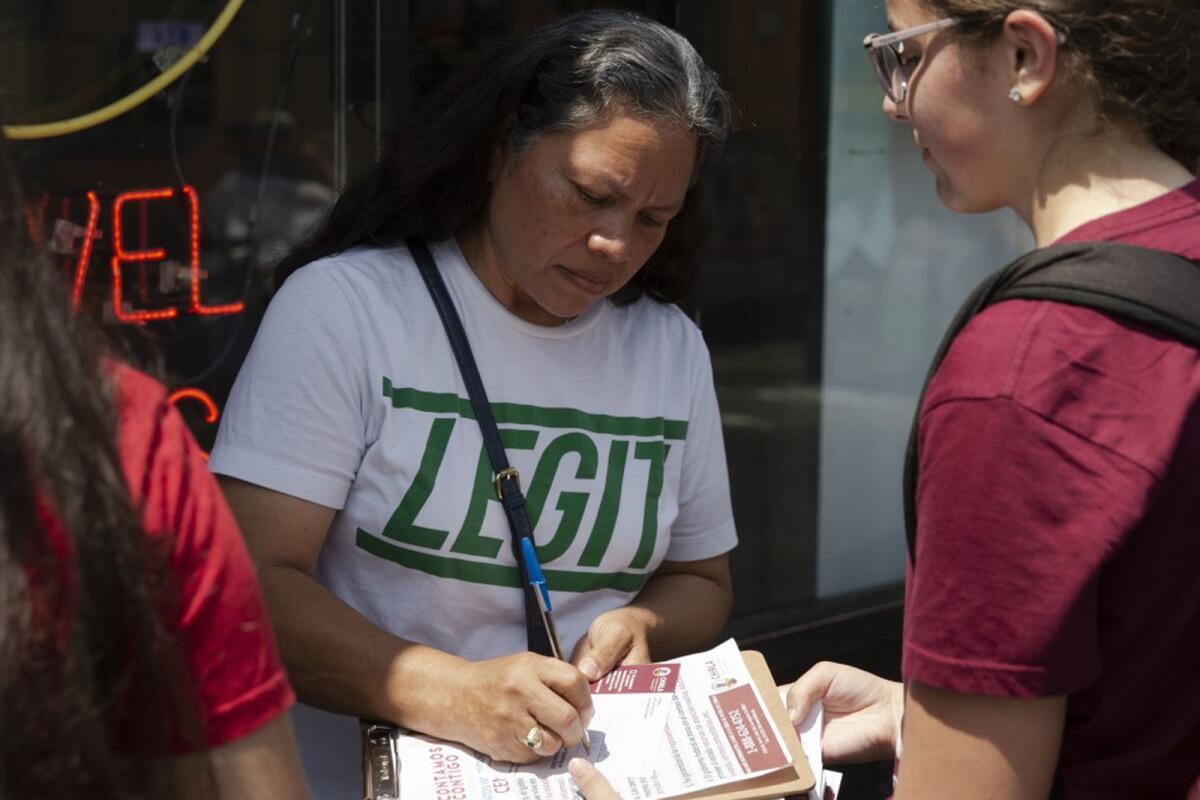With citizenship question off the census, California groups push for participation

- Share via
The interns tasked with trying to allay fears about the 2020 census crisscrossed MacArthur Park in pairs. Crossing Alvarado Street, they struck up conversations with vendors selling watermelons and headphones.
Switching between Spanish and English, they stressed the importance of the decennial count and urged merchants to sign cards pledging to fill the form out next year.
But their most important talking point was that the census isn’t a government back channel for spying on migrants.
“Today’s mission is to inform them that their data is not going to be used against them,” said Jasmine Martinez, 16.
“I want to talk to them about things they’re familiar with,” she said. “If I see them with children, then I’ll say, ‘Do you care about the future of your child?’ Hitting home is always how it works.”
A high schooler working with the Coalition for Humane Immigrant Rights of Los Angeles, Martinez and about a dozen others spent a recent Tuesday morning handing out pledge forms to passersby under the blazing summer sun.
Until a few weeks ago, many immigrant rights groups were focused on whether President Trump would be able to add a citizenship question to the 2020 census. The administration had argued the move was necessary in order to better enforce the Voting Rights Act. Opponents countered that it was a transparent ploy aimed at diminishing minorities’ voting power and the federal clout of blue states such as California.
But in June, a divided U.S. Supreme Court dealt the administration a defeat, refusing to uphold its plan to ask all households about residents’ citizenship. With the citizenship question out of the way, local officials and community organizations are now focusing on other obstacles to a complete and accurate count: fear of immigration enforcement, mistrust of government and concerns about privacy.
For CHIRLA, targeting communities such as MacArthur Park — home to thousands of migrants — is a key part of its outreach effort. In the fall, the organization said, it will begin canvassing efforts in other parts of California with large immigrant populations, including San Bernardino, Porterville, Sacramento and Huntington Park.
Immigrants and communities of color grapple with a historic distrust of the government, experts say; and others may be reluctant to respond to the census over fears of data privacy breaches, cyberattacks or disinformation campaigns similar to those found in the 2016 presidential election.
Officials have said Los Angeles County will be the nation’s hardest to tally because of its high concentrations of renters and homeless people, as well as immigrant communities that may not participate because of language barriers or fear of reprisal from the federal government. Other parts of the state, including rural areas with limited internet access, also face challenges in a census that is set to be the first one to allow all U.S. households to reply online.
“Leading off from the citizenship question, so much of what we were combating was just the general fear,” said Kevin Cosney, senior organizing manager at California Calls, a coalition of community groups. “Given the tone of this administration, I think combating those fears are still things that we need to do, so that folks, particularly in immigrant communities, know what the census is about and know about the protections around their data.”
At stake nationally are nearly $800 billion in federal tax dollars, political redistricting and the reapportionment of seats that each state is allocated in the U.S. House of Representatives. States draw on census data to form school district lines, and many of the services that people rely on in California — such as nutrition programs and housing assistance — are tied to funds calculated using the census.
In California, 72% of the population belongs to a historically undercounted group, according to the Public Policy Institute of California.
“The diversity of our population will impact our ability to count every Californian,” he said.
To broaden outreach, his organization launched a census and redistricting hub targeting black communities across the state. About 35 organizations in 11 counties are working together on direct outreach through phone banks and canvassing, Cosney said.
“Black people are least likely to participate in the census even after seeing the form and hearing messaging on why that’s important,” he said. “The intersection of the housing crisis, mass incarcerations and broad decades of government mistrust are all reasons that make black people hard to count. And on top of that, there is a significant black immigrant population in California.”
Is your area at risk of an undercount?
Sixty million Americans live in a neighborhood experts say will be hard to count in next year’s census. The most challenging places are highlighted below.
Reaching out to communities of color
Inside a San Diego auditorium on a recent weekend, dozens of locals filed into their seats for a census town hall hosted by Assemblywoman Shirley Weber. Some 36% of San Diego’s residents live in hard-to-count neighborhoods, census figures show, with a large number of them inhabiting Weber’s 79th District.
“We’re operating on data from 10 years ago,” Connie Hernandez, a regional program manager for the California Complete Count, told the room. “You and I know that communities change. Our goal is to ensure all Californians are counted.”
Many in attendance gasped when told about the nearly $150 million that state government leaders may spend through next year to help verify addresses and expand outreach efforts.
Ellen Nash, chair of the Black American Political Assn. of California, appealed to the crowd’s pocketbooks. Instead of driving for Lyft, she said, community members could be canvassing as a part of the state’s census outreach efforts while making money.
“My concern is that the word hasn’t gotten out,” said Nash, a lifelong San Diego resident. “Some of the early decisions about messaging, about employment opportunities — we’ve been left out.”
Distrust in the census is prevalent among Asian immigrants and Pacific Islanders as well, said An Le, census lead for Asian Americans Advancing Justice.
In January, a Census Bureau study found that 41% of Asians said they were either “extremely concerned” or “very concerned” that their answers would be used against them. African Americans and Latinos followed closely behind at 35% and 32%, respectively.
“Even if the citizenship question is not on there, I think people are going to be suspicious. At the base level, we’re still going to feel the after-effects of that. The damage has been done,” she said.
Le said she also is concerned about renters, who are difficult to track. If an apartment has more people than a landlord allows, the renters may refuse to answer questions.
She recently spoke about the housing issue with the head of an immigrant rights organization that primarily works with people who are in the country illegally, she said. When Le explained that such information would not be shared with a housing authority and that renters shouldn’t worry, the woman looked at her with skepticism.
“I’ve been trying to repeat this message often, that it’s not just the citizenship question,” Le said.
AAAJ plans on working with organizations that will target youths, who often act as navigators for their families and communities. In smaller pockets of the state where there are fewer resources — including parts of the Central Valley and Yolo and Yuba counties — Le and others hope to target community institutions and informal gathering places where census information can be shared.
“It’s the religious institutions and that corner market where people will cluster,” Le said. “We can put a poster on their door and have the content of the posters drive people to our website, where there’s community education materials, or webinars…. We have to be creative.”

Dispelling privacy concerns
Although the citizenship question won’t be included in next year’s count, experts say that many Americans continue to feel skeptical about the confidentiality of their information and what data will be shared.
Officials and privacy advocates have stressed that Census Bureau employees are sworn to protect confidentiality and that, under federal law, it is illegal for the bureau to publish private information. Anyone who violates that law faces penalties including a federal prison sentence of up to five years, a fine of up to $250,000, or both.
But that hasn’t helped to persuade many who worry about sharing information online, Le said.
“The switch to the online format is going to have a negative impact on the participation of seniors and immigrants,” Le said. “I’m just imagining my dad getting this census. I know he would be absolutely confused. He’s not comfortable with English. There will be language assistance in Vietnamese, but I don’t know if my dad would feel comfortable calling someone and giving information over the phone.”
In an April report, the Government Accountability Office said it placed the 2020 census on its “high-risk” list because the bureau is using innovations — such as allowing the public to respond using the internet — that are not expected to be fully tested. The bureau also continues to face challenges with information technology systems and significant cybersecurity risks to its data, the report said.
John Thompson, former director of the U.S. Census Bureau, said that there was no question during his tenure that the census would be a target.
“We were concerned about cyberattacks, people attacking systems or stealing data and things like that,” said Thompson, who resigned in 2017. “When I was there, the Census Bureau was doing everything right, I thought, to protect cybersecurity. I have no reason to believe they’ve lessened their efforts.”
Thompson said that the bureau will need help from tech companies such as Facebook, Google and Twitter to combat disinformation campaigns. Facebook announced in June that it would build a team dedicated to census security efforts, and said it would introduce a new policy in the fall that would protect against census misinformation.
“An accurate census count is crucial to governments for functions like distributing federal funds and to businesses and researchers,” Facebook said in an online statement. “That’s why we’re going to treat next year’s census like an election — with people, policies and technology in place to protect against census interference.”
But the stakes for getting the count right go far beyond federal funding, Thompson said.
“If you can disrupt that event,” he said, “you would do serious damage to our democracy.”
More to Read
Sign up for Essential California
The most important California stories and recommendations in your inbox every morning.
You may occasionally receive promotional content from the Los Angeles Times.











